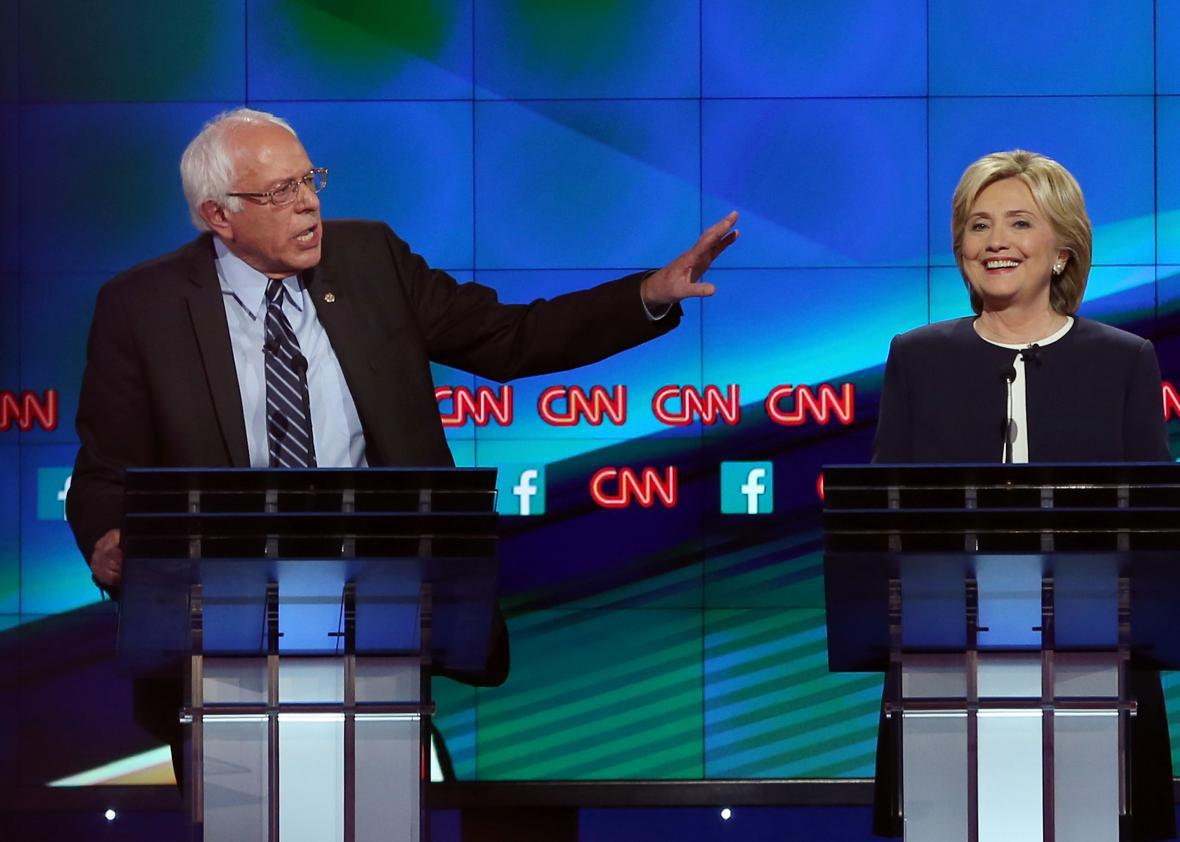Thanks to Bernie Sanders, Tuesday night’s Democratic debate included a brief argument about socialism versus capitalism that was completely without red-baiting. It was at the start of the event, when Anderson Cooper questioned the candidates about what he took to be their greatest weaknesses. “How can any kind of socialist win a general election in the United States?” he asked Sanders, who launched into an unabashed defense of Scandinavian-style social democracy.
In response, Hillary Clinton defended capitalism, not bombastically, but earnestly: “[W]e are not Denmark. I love Denmark. We are the United States of America. And it’s our job to rein in the excesses of capitalism so that it doesn’t run amok and doesn’t cause the kind of inequities we’re seeing in our economic system. But we would be making a grave mistake to turn our backs on what built the greatest middle class in the history.”
The remarkable thing about this exchange is that capitalism itself, rather than the quixotic senator from Vermont, was on the defensive. It demonstrated that, whatever else happens, Sanders has already accomplished something profound for American progressives.
Indeed, although Clinton won the overall debate, Sanders set its terms. From the beginning, Clinton sought to appeal to his supporters rather than vice versa. Consider her answer to Cooper’s question about her ideology. “Just for the record, are you a progressive, or are you a moderate?” he asked. She responded, “I’m a progressive. But I’m a progressive who likes to get things done.”
What proceeded was discussion about who could best implement a progressive agenda, in which the agenda itself was taken for granted. As Clinton said at one point, “[W]e agree on the goals, we just disagree on the means.” That was a pretty amazing thing to hear, given that Sanders’ goal is universal social insurance. At another moment, Clinton said, “We need a new New Deal for communities of color.” It was a long, long way from her husband’s promise to end welfare as we know it.
In the past, Democrats have started from conservative premises about Social Security’s threatened insolvency. This time, they talked about how to expand it. “I want to enhance the benefits for the poorest recipients of Social Security,” Clinton said. She was asked whether, like her rivals to the left, she supported in-state college tuition for undocumented immigrants and did her best to make their position her own: “My plan would support any state that takes that position, and would work with those states and encourage more states to do the same thing.” She sought to outflank Sanders to the left on gun control, accusing him of being too soft on the gun lobby: “This has gone on too long and it’s time the entire country stood up against the NRA.”
It almost made me happy to see Jim Webb—whose most memorable moment was a boast about killing a man—onstage to serve as the ghost of politics past. Hard as it is to believe now, Webb, Ronald Reagan’s former naval secretary, was once a darling of Democratic activists who saw him as a counter to Republican charges of weakness. He ran for Senate in 2006 after a lively netroots “Draft Jim Webb” campaign, and a year later he was widely seen as a fitting running mate for Obama. Eight years later, his irrelevance at the debate was evidence that Democrats are done chasing a center that Republicans keep pulling rightward. All the energy in the party is with people who proudly align with the left.
Sanders doesn’t deserve all the credit for this. Left-wing economic populism was ascendant before he announced his campaign, visible in everything from Occupy Wall Street to the draft Elizabeth Warren campaign to the growth of union organizing among young new media workers. But he has mobilized progressive sentiment in a very practical, constructive way. He’s the anti–Ralph Nader, changing the Democratic Party from within rather than threatening to spoil the election from without. This is what right-wing activists have long done within the Republican Party, to lasting effect.
His most newsworthy moment, of course, came when he declined Cooper’s invitation to attack Clinton for using a private email server. “[L]et me say something that may not be great politics,” he said. “But I think the secretary is right, and that is that the American people are sick and tired of hearing about your damn emails.”
Sanders was wrong: It was great politics. His statement made him look like a mensch and a man of principle, ensuring that the debate remained a surprisingly substantive exchange on the issues he cares about most, rather a GOP-style pro-wrestling match. He actually seemed less interested in taking down the front-runner than in elevating his own ideas. That’s hugely rare in a politician. Clinton supporters who want a more progressive America have reason to be grateful for her strongest challenger.
See all of Slate’s coverage of the Democratic primary debate.
